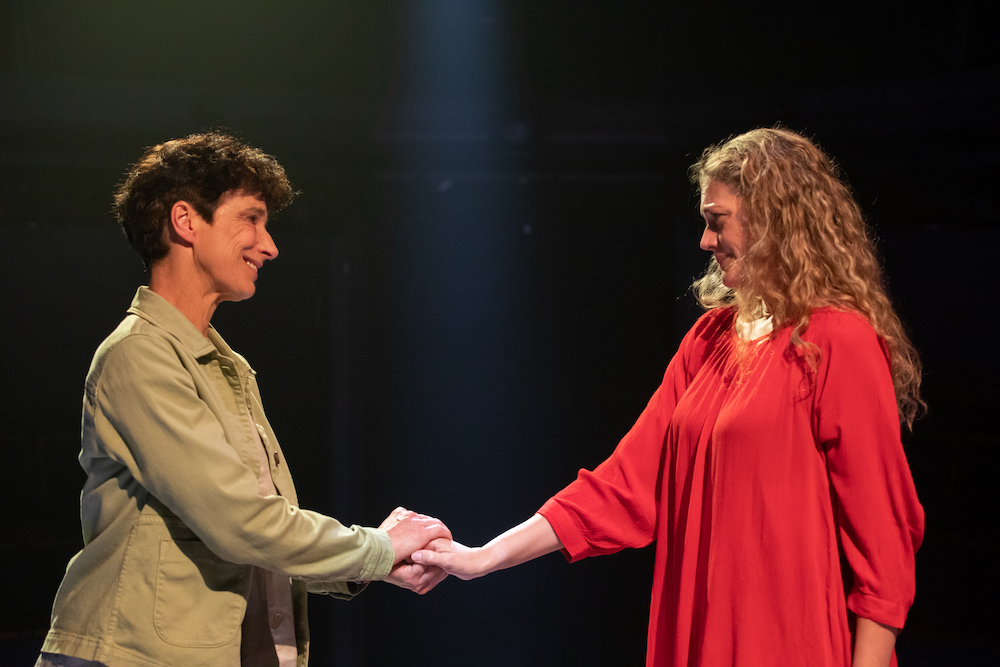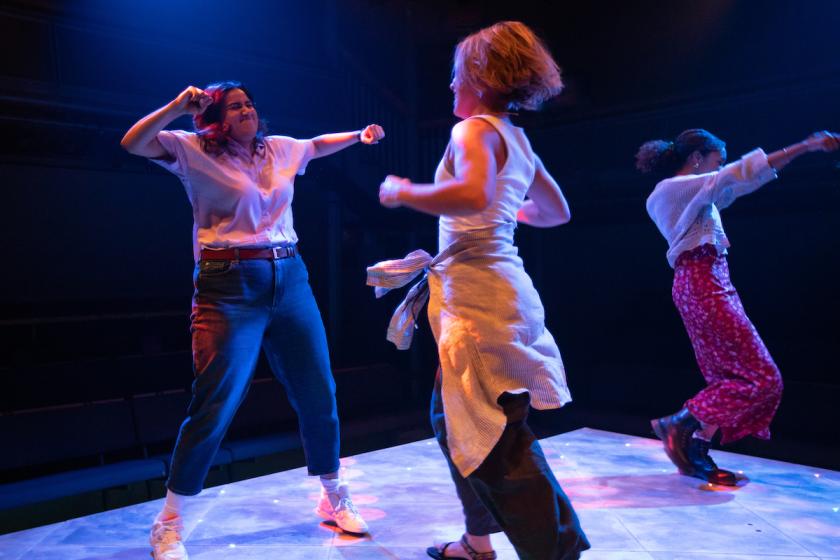There are some songs, and singers, that make your heart swell. One of them, for me, is Ani DiFranco’s 1998 single “Little Plastic Castle”, so I was delighted to see that Isley Lynn, in the playtext of her new show at the Orange Tree Theatre, has chosen, as an epigraph, a line from DiFranco’s song “Promised Land”: “And they say that the truth will set you free/ But then so will a lie.”
I have to say that this captures, in all its suggestive complexity, the essence of this superb play about love, desire, deceit and commitment. The plot is classic: 27-year-old Annie is engaged to Bel, who’s slightly younger, and the couple plan to get married is about six months’ time. Although Annie’s family accept that she’s a lesbian, Bel has some problems with her folks, and she ran away from home as a teenager. All looks rosy until Annie’s childhood friend Flo, who is an adventurous free spirit, visits them and wants to stay, and a love triangle begins to develop. The contrast between the wildly enthusiastic Flo – a globe-crossing surfer – and the more restrained and conventional Annie comes across well during the dance sequence, and you can see how each woman appeals in different ways to the slightly unsure Bel.
The brilliant thing about The Swell, whose title refers to a variety of things, such as the loving heart, the tidal waves and the music of a choir, is that Lynn intersperses episodes about the youthful women with scenes showing them 28 years later, so we can see how their relationships have panned out. She also includes a really daring plot twist, a mind-bender of an idea, which results in one woman becoming a lifelong carer and another a dependent housebound patient. The way these two women respond to these changes says a lot about personal identity, the way that love develops with age, and how couples can tacitly agree to live with a lie when the truth would tear them apart.  The subtle ambiguity of Lynn’s playwriting keeps the audience guessing, for a good part of the 90-minute play, not only about what exactly has happened, but also about what the characters really know. This tantalising feeling of beautiful uncertainty is enhanced by the fact that the older characters are played by actors who have been deliberately cast not to look like their younger selves. So the relationships shown on stage are implicitly designed to question our ideas about what love is (lustful desire or long-term commitment, or both, or neither) and how feelings change over the decades. And also to think about about theatrical representation: should it be literal or metaphorical?
The subtle ambiguity of Lynn’s playwriting keeps the audience guessing, for a good part of the 90-minute play, not only about what exactly has happened, but also about what the characters really know. This tantalising feeling of beautiful uncertainty is enhanced by the fact that the older characters are played by actors who have been deliberately cast not to look like their younger selves. So the relationships shown on stage are implicitly designed to question our ideas about what love is (lustful desire or long-term commitment, or both, or neither) and how feelings change over the decades. And also to think about about theatrical representation: should it be literal or metaphorical?
Lynn expertly creates a situation in which both people in a couple are complicit in a major deception, and the queerness of it all comes from this blurring, or dissolving, of the binary between truth and lies. Identity here is fluid. The playwright also shows how caring can be a form of coercive control; however well intentioned this involves being cruel to be kind. On the other hand, there is a touching aspect to the portrayal, derived from the classic work of neurologist Oliver Sacks, of living with brain damage. The impression of meanings swelling up as the play develops is a characteristic of the writing.
As well as ambiguity, and the deep theme of betrayal and deception, there is a lot of good fun in this drama. There’s laughter as Bel and Annie tell Flo the story of how they met, there’s a tender moment when one woman helps another during a panic attack, there’s a yoga session that is humorously enacted and the twin loves of surfing and singing are portrayed with a really emotional, well, swell. The queerness of the piece is also shown both in its passions and in its light-hearted moments. Gradually, a real sense of humanity pervades the play’s lifelong span, which argues that romance and care can be deeply related.
Hannah Hauer-King’s excellent directing – in a coproduction with the Women’s Prize for Playwriting – has a warmth and energy that makes the story both watchable and its twists gasp-inducing. On designer Amy Jane Cook’s versatile platform stage, with its opening hatches that create bars, a hospital and the seaside, a thoroughly convincing cast perform in an ambiance greatly enhanced by composer Nicola T Chang’s music. As the young ones, Saroja-Lily Ratnavel (Annie), Jessica Clark (Flo) and Ruby Crepin-Glyne (Bel) create a thrilling feeling of youthful joy, while their older counterparts, played by Shuna Snow and Sophie Ward (pictured above), and Viss Elliot Safavi, explore the more painful consequences of young love. This is the best piece of new writing in London.















Add comment